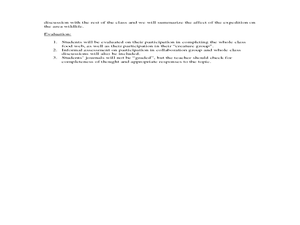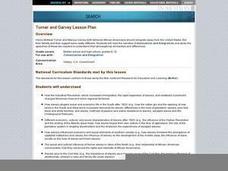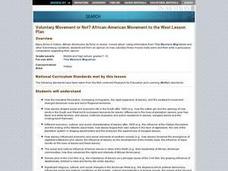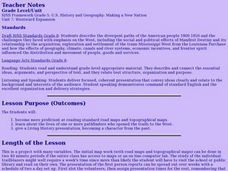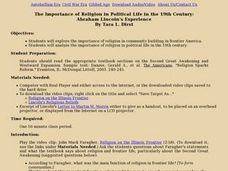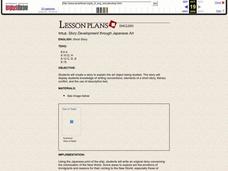Curated OER
How We Got to Kansas-Nebraska
Students explore the causes of the Civil War. In this lesson plan on slavery students use primary sources to examine the evolution of the issue of slavery and in the American political system. Students will then write a follow-up essay...
Curated OER
Animals and the Food Webs that Love Them
Students study the animals that Lewis and Clark would have encountered. In this animals activity students study the food web and how human populations have affected them.
Curated OER
Utah Indian - Future Changes
Fourth graders discuss and share ideas on how they think the Utah Indian tribes change in the future.
Curated OER
A Comparative Look at Migrations
Students explore and compare and contrast the migrations of African Americans in the United States in the decades before and after the Civil War.
Curated OER
Nevada Trilogy
Students simulate and plan a trip from St. Louis to the Sacramento Valley as early emigrant parties would have. They list necessary provisions for the amount of time they would spend traveling.
Curated OER
Differences in Location Lesson Plan: Treatment of Early African Americans
Students reach The Domestic Slave Trade, then examine the differences between the people enslaved in North America as opposed to those in Brazil.
Curated OER
Forest Joe Lesson Plan: Outlaw or Hero?
Students become familiar with an American legend that is unfamiliar to many. Presented with the legend of Forest Joe, a runaway slave who, much like Robin Hood, stole from the rich to give to the poor, students draw comparisons and...
Curated OER
African American Emigration: Turner and McNeal
Students discuss reasons why African Americans may have wanted to emigrate from the United States followig the Civil War. They complete a Venn diagram noting the differences between proposals by Marcus Garvey and Henry McNeal Turner.
Curated OER
Mixing Races in New Orleans
Learners discuss the changes in the legal, social, and political status of African Americans and those of mixed ethnicity after reading the narrative, Haitian Immigration: Eighteenth and Nineteenth Centuries.
Curated OER
Voluntary Movement or Not? Africian-American Movement to the West
Ninth graders, in groups, determine reasons for African-American migration to the west
Curated OER
Moving West with the Forts: Using an Interactive Map
Students discern a map of Texas and it's forts in the early to mid-1800's. From this map they analyze movement from the moment Texas became a state to its involvement in the Civil War.
Curated OER
Ideas and Commodities Cross Cultural Regions
Students compare and contrast how commodities native to certain countries have impacted the economies of other nations. After gathering information regarding how commodities are grown and traded, students use their information to...
Curated OER
A Sense of West Virginia
Students consider their perceptions of the world through their 5 senses while visiting the West Virginia State Museum. In this West Virginia history lesson, students discover how knowing about the past helps with their understanding of...
Curated OER
Hispanic Immigration: America in the Year 2000
Students investigate the underlying reasons for immigration, focusing on five major trends: political, economic, family, career and educational. They examine the immigration of Spanish speaking groups.
Curated OER
Introduction to Mining in Utah
Learners come up with a definition of mining together as a class. They take notes and explore how three mining towns in Nevada were begun.
Curated OER
Five Utah Indian Tribes
Fourth graders study the five Utah Indian Tribes being able to identify the tribes by name and location.
Curated OER
Making A New Nation
Eighth graders read standard road maps and topographical maps, and examine the lives of pathfinders who opened the trails to the West. They develop Living History presentations, role-playing a character from the past.
Curated OER
The Importance of Religion in Political Life in the 19th Century: Abraham Lincoln's Experience
Eleventh graders explore the importance of religion in community building in frontier America. They analyze the importance of religion in political life in the 19th century.
Curated OER
STORY DEVELOPMENT THROUGH JAPANESE ART
Eighth graders create a story to explain the art object being studied. The story displays students knowledge of writing conventions, elements of a short story, literary conflict, and the use of descriptive text.
Curated OER
Maps of Indian Territory, the Dawes Act, and Will Rogers' Enrollment Case File
Students, in groups, analyze one map at a time, first the 1885 map, then the 1891 map. After they have completed the analysis sheets, they compare the two maps and answer questions imbedded in the plan.
Curated OER
Geography and Social Sciences
Students identify and explain how geography is connected to other academic areas and historical events.
Curated OER
Fort at No. 4 History
Pupils examine the history of Fort No. 4 in New Hampshire before visiting the site. They identify key events and people that occured at the fort as well. They complete questions and teach them to their group.
Curated OER
Patterns of Settlement in Early Alabama
Fourth graders study the settlement of Alabama. They collect data from the U.S. census website and answer questions regarding settlement patterns in the counties of Alabama in 1820. They write a paagraph describing where they would have...
Curated OER
Southern Agriculture and the Slave Trade
Students examine the relationship between agriculture and the slave trade during the 1860s. In groups, they research how two factors led to the explosion of slavery in the Southern United States. Using maps, they answer comprehension...
Other popular searches
- Westward Expansion Activity
- U.s. Westward Expansion
- Westward Expansion Unit
- American Westward Expansion
- Westward Expansion Unit Map
- Westward Expansion Graphs
- Westward Expansion Grade 5
- Westward Expansion Dioramas
- Us Westward Expansion
- Westward Expansion Unit Plan
- Westward Expansion Movement
- Unit Plan Westward Movement



